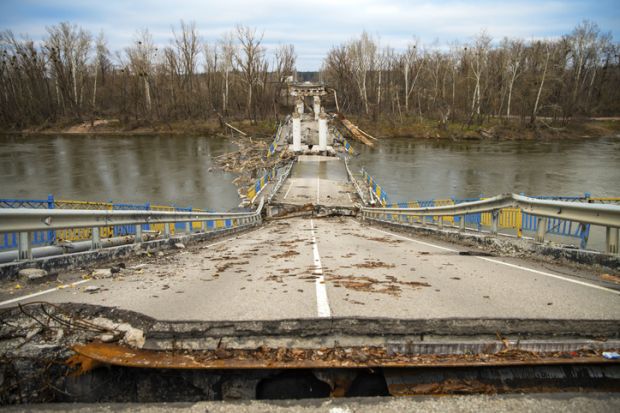The two years of fighting since Russia’s invasion have had an inevitable impact on Ukraine’s human capital and labour productivity.
Last year, the Centre for Economic Policy Research (CEPR) estimated that Ukraine’s human capital will fall by up to 3.6 per cent per year between 2022 and 2035, with 0.9 per cent of that because of educational losses and 2.7 per cent because of the loss of workers’ skills. Productivity will decrease by an average of 6.7 per cent over the same period, the centre predicted.
The CEPR also estimated that the effect of the lost human capital will disappear only after 2085. And all that assumed that the war would last only two years. As we approach that anniversary with no sign of a Russian withdrawal, it is clear that the CEPR’s assumption was too optimistic.
People, their knowledge and skills are crucial to economic development. In the developed world, human capital accounts for up to 75 per cent of national wealth. But to make rapid advances in human capital development, Ukraine can’t rely on the standard four-year bachelor’s cycle. Particularly in an era of rapid technological change, it will be vital to embrace lifelong learning so that existing workers’ skills, both hard and soft, can be constantly updated, ideally every two to four years.
Last autumn, Ukraine’s government approved the draft state budget for 2024, which allocates UAH 178.8 billion (£3.7 billion) for education. This is almost 22 per cent more than in 2023. However, lifelong learning is far from being a priority of policymakers in Ukraine – and, therefore, of Ukrainian rectors and employers.
According to a 2019 Unesco report, 11 per cent of Kenyan workers receive lifelong learning services at the expense of their employers. In Ghana, the figure is 7 per cent and in Vietnam 5 per cent. In Ukraine, it is just 2 per cent – and these are pre-war figures. To recover from the war, Ukrainian employers’ investment in lifelong learning needs to be at least an order of magnitude higher.
Ukraine needs international aid for recovery and development, but we must rely on ourselves first and foremost and look for domestic sources of investment and economic development. For example, Ukraine’s GDP could grow by 1.8 per cent to 2.1 per cent by 2030 only through high-quality professional development of those employed in the country’s economy, according to a 2021 report by PwC. That would amount to an extra UAH 100 billion.
Such figures ought to prompt the Ukrainian government to invest heavily in lifelong learning. Yet, currently, Ukraine ranks only 116th in the world for its public investment in lifelong learning, according to the Global Talent Competitiveness Index 2023. This puts it behind the likes of Zambia (84th), Uganda (97th), Tanzania (95th), Rwanda (97th), Nigeria (62nd) and Nicaragua (67th). Neighbouring Poland, by contrast, ranks 36th in the world.
It is probably no coincidence that Ukraine ranks only 83rd for labour productivity, too, behind Namibia, Botswana, Colombia and Algeria. This is a very uncomfortable starting point for the country’s recovery, particularly as a significant share of holders of higher education graduates in Ukraine are in the so-called “qualification pit”, according to a 2022 European Training Foundation report. That is, 32.2 per cent perform work that does not require higher education (vertical mismatch) and 53.28 per cent work in a different specialty from the one in which they received higher education (horizontal mismatch).
It will be very difficult to pull so many people out of the “qualification pit” with the tools of higher education in a reasonable time frame. At the same time, lifelong education, with the involvement of qualified academics, can make a significant difference.
To that end, the role of all participants in Ukraine’s education system should be clarified to determine what each of them, including higher education institutions, can contribute to the development of lifelong learning. Currently, universities in Ukraine pay little attention to providing lifelong learning services. The role of the state is crucial for changing this, popularising lifelong learning among employers and the public. If that demand can be boosted, universities must be helped and incentivised to meet it.
Of course, lifelong learning should not just be a priority for Ukraine. It is vital for every country that wants to remain competitive in the digital age. In that regard, university ranking organisations could encourage universities to meet the challenge by including measures of their contribution to lifelong learning in their rankings.
But Ukraine should need no such incentive. It is already abundantly clear that lifelong learning should be one of its strategic priorities. The quicker Ukrainian universities can be brought up to speed, the quicker the nation will recover from the war – however long that war might last.
Alexander Kostyuk is director of the Virtus Global Center for Corporate Governance and editor-in-chief of the journal Corporate Ownership and Control.
Register to continue
Why register?
- Registration is free and only takes a moment
- Once registered, you can read 3 articles a month
- Sign up for our newsletter
Subscribe
Or subscribe for unlimited access to:
- Unlimited access to news, views, insights & reviews
- Digital editions
- Digital access to THE’s university and college rankings analysis
Already registered or a current subscriber? Login








